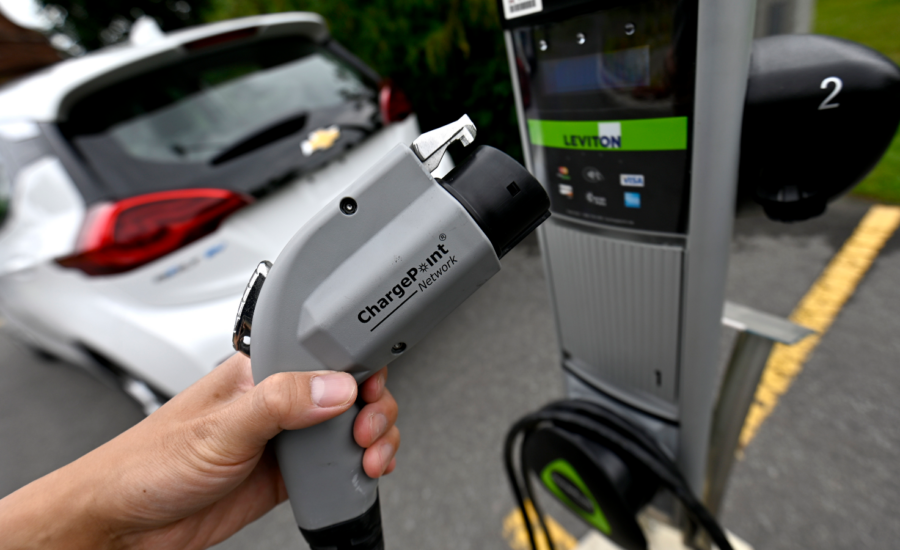Fewer Canadian drivers planning to buy an EV or hybrid
A new EY survey has found that demand for EVs and hybrid vehicles has dropped slightly, with drivers citing cost and driving range as major concerns.
Advertisement
A new EY survey has found that demand for EVs and hybrid vehicles has dropped slightly, with drivers citing cost and driving range as major concerns.

A new survey finds fewer drivers intend to make their next car purchase an electric vehicle.
EY’s Mobility Consumer Index report shows overall intentions among survey respondents to buy a new vehicle were up 6% compared with last year. But fewer of them are leaning toward buying an EV.
Intentions to buy a fully electric, plug-in hybrid or hybrid vehicle in the next two years slightly dipped to 50% this year, compared with 52% in 2023, the report, published Wednesday, said.
It breaks the trend of increases in recent years. In 2021, about 35% of all potential vehicle buyers in Canada were interested in an EV or a hybrid, that number jumped to 46% in 2022.
“That flattening curve is something new that we’re seeing,” said Jennifer Rogers, automotive and transportation leader at EY Canada, in an interview.
When it comes to fully electric vehicles only, buying intentions fell to 15% this year, compared with 18% last year.

Apply for a personal loan with a 8.99% to 29.49% APR. Plus, 100% online application and no early repayment fees.

Apply for a personal loan with a 9.99% to 34.95% APR. Plus, fast e-transfers and no hit to your credit score when you apply.

Apply for a personal loan with a 19.90% to 34.90% APR. Plus, fast funding (as soon as the same business day). Not available in Quebec, PEI, Manitoba, Newfoundland and Labrador, Northwest Territories, Nunavut and Yukon.
The top concerns survey respondents had are the limited driving range, the price tag of EVs, expensive battery replacements and a lack of charging infrastructure.
“The lack of charging infrastructure and the range anxiety is sort of working hand-in-hand,” said Rogers, adding people are particularly concerned about charging their vehicles outside of their home.
She said improving public charging infrastructure can reduce range anxiety among EV drivers.
“It’s going to be very challenging to sort of convince consumers to take that next step without there being some sort of comfort around the ability to charge outside their home,” Rogers said.
She said consumer concerns need to be addressed if Canada wants to meet its target of all new light-duty vehicle sales being zero-emission by 2035.
In December 2023, the federal government finalized its plans to gradually phase out sales of new gas-powered cars in favour of zero-emission vehicles.
The phase-out will happen in stages: 20% in 2026, increasing to 60% by 2030, and reaching 100% by 2035.
Rogers says the drop in demand for EVs “definitely shows there’s going to be a lot of pressure on meeting those targets.”
The price tag of electric vehicles, combined with economic headwinds such as inflation and high interest rates, may also dissuade many car buyers from considering EVs.
According to Canadian Black Book, the average cost of an electric vehicle was about $73,000 in 2023.
Meanwhile, some automakers have delayed or paused EV production as demand drops. Ford Motor Co., for example, pushed out its plans to manufacture EVs at its Oakville, Ont., plant by two years.
In under five minutes, compare personalized auto insurance quotes from Canada’s top providers.
Government rebates have played an important role for people considering EVs, with 28% of Canadians saying incentives are a top consideration when purchasing, the report said.
But Rogers said incentives aren’t enough to drive demand for EVs as fewer affordable options exist.
“Even though incentives are available for them to take … that incentive on its own probably isn’t enough to change that consumer behaviour,” she said.
For those who were considering buying an EV, steep gasoline costs were top of mind, followed by environmental considerations and monetary incentives, according to the report.
Rogers said it is easy to get early adopters into the EV market, but it could take time to capture a bigger cohort.
“That next block of people that need to make the move from the combustion engine to electric vehicles is going to be a little bit harder to convince,” she said. “They may be more price sensitive, may not have as easy access to in-home charging.”
Share this article Share on Facebook Share on Twitter Share on Linkedin Share on Reddit Share on Email
Good luck getting to 100% EV by 2035. Canada will be lucky to get to 40 or 50% by 2035.
People should consider renting an EV over a holiday period to simulate what their use might be on the daily. This would give them a glimpse to the pros and cons, instead of assuming what the real limitations might be.
And in Alberta there is going to be an ANNUAL $200 tax on fully electric vehicles when you renew your registration in 2025.
I would like to know how EV’s made out in the huge snow storm the first week of Dec? North of London Ontario schools were closed, most places had 4 feet of snow on the level! How did EV’s function- able to get through snow, did they have heat in side, would battery start out in cold weather in parking lots, was distance travelled reduced…… etc? In rural areas how do they perform?
Canada has a harsh winter. If you plan to drive outside of a city an EV is not reliable. There’s no way I’ll ever trust an EV to get me through a mountain pass in the winter. Cold reduces range, chargers are sparse, and a random highway closure forcing you to backtrack hundreds of kilometres could leave you in a pickle.